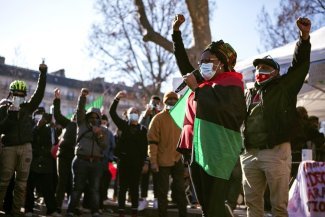Iraqi and international troops have been in Mosul, the bastion of the so-called Islamic State (IS) since 2014. Zekine Türkeri, author of Un Verano Kurdo (A Kurdish Summer, Editorial Descontrol, 2016), is convinced that the consequences of this operation will be, once again, disastrous for all.
“It’s too late for the Middle East and it’s too late for (Turkish President Recep Tayyip) Erdogan. There is no solution for the Middle East. How are they going to put an end to IS? I can bet you it’s impossible, because there is so much shit piled up,” says Türkeri.
She knows what she is talking about. She was there, metres away from the jihadists, when IS took Mosul, and she documents it in her book, from which she quotes passages in this interview for Equal Times.
Let’s talk about her life first. Türkeri does not celebrate her birthday, because she does not know exactly when she was born. The Kurds at the time did not register births and birthdays, she says, are more of a Christian thing. “I don’t even have a year, I don’t know when I was born. I put 1967 out of respect for my father,” she explains in colloquial Spanish. “My father used to say I was born in the year they killed Che Guevara.”
The daughter of day labourers in a small village of 200 Kurdish Alevi inhabitants in Malatya (eastern Anatolia), called Çiğilia, which means “the cry”, Türkeri started to pick beetroot, wheat and apricots with her parents at the age of seven. There were extremely poor. But this bright young girl, one of the couple’s three daughters, was the first in her village to go to university in Ankara – the most prestigious in the country – where she studied political science.
She was fired her from the bank in Ankara where she was working as a financial analyst, for having spoken to her mother in Kurdish on the telephone. From there she fled to Havana, with the ironic excuse of an economic analysis grant, in the middle of Cuba’s Special Period following the collapse of the Soviet Union. She worked with the renowned Spanish filmmaker Elías Querejeta on the documentary La Espalda del Mundo (The Back of the World), which helped with her residency in Spain, where she lived for a decade. She returned to Istanbul in 2011.
A neutral perspective within a polarised society
Not only does Türkeri not mince her words when talking about taboos such as machismo among Kurds, but she has a rare perspective, analytical and neutral, in a polarised society.
It beIn her book, she talks about her first visit and coverage of Iraqi Kurdistan and Syria during the summer of 2014, when the jihadists were taking over a substantial part of the territory and terrorising people with filmed executions.
“We are retaking Mosul. I don’t know if they’re pulling our leg, if they are serious. There are hundreds of thousands of civilians living there that are going to trigger a new wave of refugees that not even the oil of Iraqi Kurdistan is going to be able to cover.” At least a million, according to observers.
The dumping ground of the Middle East has opened the floodgates. Thirteen years of war in Iraq and almost six in Syria are producing a wave of terror and radicalism in the region and the rest of the world. Turkey is on a knife edge.
Türkeri, who cannot live without Spanish tortilla or pacharán (a Spanish liqueur which is made from crushed and fermented sloes) since she left Spain, says it is the fault of the West. That is what they all say here, but she explains it without revanchism.
“Western governments are well aware of it, they know they have done serious damage. The fact that the Middle East is in this state is the fault of the West. Because they installed dictators in the region and they looked the other way for more than a century.
“I’m talking about the end of the Ottoman Empire, the Sykes-Picot Agreement (1916), but also about the governments here. I’m not blaming the people, because the people here have never had power. Have you ever seen a left-wing [movement] that survives in the Middle East? Only the Turkish one, and even here it is persecuted. In Syria, they could arrest you and you would disappear for 10 years. Are these what you would call normal governments? The West supported them and it is going to pay for it.”
Documenting Qandil, Mahmur, Erbil and Sinjar
Türkeri covered these Kurdish areas for her TV channel, IMC (International Media Center), which of the Turkish government has just closed down as part of the repression following the failed coup d’état of 15 July.
She had, for years, been wanting to film the female guerrilla fighters of the PKK (Kurdistan Workers’ Party), considered a terrorist group by the European Union, the US and Turkey, who live in hiding in Qandil Mountains in northeast Iraq.
The one month trip also took her to the Kurdish refugee camp of Mahmur, a miracle of survival in the middle of the desert and the scorpions; to the capital of autonomous Kurdistan, Erbil; to the gates of Sinjar, where the IS fighters were about to go in and carry out the 73rd genocide against the Yazidis, Kurds who practice an ancient religion linked to Zoroastrian Mazdaism.
In the 45-degree heat of Mahmur, Türkeri found hairdressers worthy of an Almodóvar movie, and enjoyed watching Paz Vega playing Carmen on the TV with the women in the camp. Türkeri’s Hispanic irony is difficult for her compatriots to understand.
She witnessed how the autonomous government of Erbil, the Kurdish Peshmerga and the Iraqi army abandoned the Yazidis. Something history will have to explain, she says. The People’s Protection Units (YPG, of Rojava) and the PKK (Turkish Kurdistan) did go to their aid, but there was little they could do. Mass graves are still being discovered.
Türkeri has Yazidi roots. Her grandmother and mother had converted to Alevism. She remembers how her mother used to pray to the sun and the moon and would wash her daughters’ hair with April rainwater to bring them good fortune, practices now considered heretical by the dominant Islam.
Many of the women Türkeri interviewed were killed by IS: the young camerawoman Deniz, who had been documenting the spread of female genital mutilation among Iraqi Kurds, and the snipers Ararat and Avesta. She also explains why adolescent girls, full of anger over the deaths of their close ones, go to the hills to fight, and have nowhere to return to.
She felt the chill of fear in Erbil when she found herself surrounded by men who were coming out of Friday prayers. “If I hadn’t been with my friend Doğan, there would have been a gang rape. Because sex has been forbidden for so many years. There was no Internet 20 years ago, people didn’t see it. But now you go in a cave and you see a porn film. You see tits that are forbidden.”
The friend Türkeri is referring to is Doğan Güzel, a cartoonist from the leftist daily Gündem, who followed his friend Zekine to Spain, out of romanticism, and stayed in Seville because “he likes the tapas there”. Another colleague from Gündem, Rahmi Batur, ended up in León selling kebabs.
“They already know hell, it’s their life”
At the end of her book, the journalist describes the moment when Kurdish guerrilla fighters turn on a group of IS prisoners and the women guerrillas stop the lynching.
“I felt sorry for the prisoners when I saw them. I saw the present-day face of the Middle East, a sad Middle East, plunged into misery. They were young Arabs.”
The YPG commander who received her in the village of Rimelan, near the front, described the problem like this:
“The Middle East is a dumping ground. It would be over-simplifying things to say that US imperialism is to blame. There are people who feel highly discontented, highly humiliated. It is very difficult to fight against them because they come to kill and to die. It is very difficult to fight an enemy like that. I asked him, if they are believers, they shouldn’t they fear hell? And he answered: they already know hell, it’s their life.”
All western models have failed here, including Erdogan Islamist democracy, which, according to Türkeri, is on the fast train to fascism. “The Middle East will bring an end to the European Union. When civil war breaks out here, the next day you will have 50 million refugees in Europe. “The world has been too unjust, but now it’s not just the poor, the rich are going to pay too. Neither Erdogan, nor the US, nor Russia know what they are going to do tomorrow. They are all improvising.”










